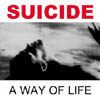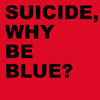Suicide changed my life. This summer, New York City was treated to anexclusive one-off concert of the legendary duo of instrumentalistMartin Rev and vocalist Alan Vega at the Knitting Factory. Drenchedfrom the downpour outside, I shivered with my beer until they arrivedon stage and proceeded to show this jaded critic just how powerful aseemingly simple two man performance can be. Ripping through a set ofclassics ("Ghost Rider," "Cheree") and more recent material ("DeathMachine," "Misery Train," the unreleased "Friday Night Fever"), Suicideenergized the entire audience again and again, ultimately leaving touproarious hollers and applause. Immediately afterwards and still, Iconsidered this night to be one of the greatest musical experiences inrecent years, rivalling several notable shows including the return ofPsychic TV.Naturally, my excitement peaked yet again when I learned that Mutewould be reissuing two essentially forgotten Suicide records thiswinter. While their first two albums, given the Mute reissue treatmentback in the late nineties, are regarded as their most influentialrecordings, 1988's A Way Of Life and 1992's Why Be Bluewere overlooked in an almost malicious fashion and have finally beengiven a second chance. Up until now, these Ric Ocasek produced releaseshave received little attention beyond the collective stereos of adoringacts like Depeche Mode, Pan Sonic, Primal Scream, and Spacemen 3.
 Wax Trax! completists may remember A Way Of Lifewith a certain amount of distaste. Unaware, uninformed consumersexpecting the reformed duo to adopt the sound of labelmates Front 242,Meat Beat Manifesto, or Greater Than One were surely aghast at thealbum's overt, unabashed reverence for Elvis Presley and early rock androll. Though it failed to fit comfortably amongst that wave ofindustrial music, the album exudes a similar emotive quality to that oftheir second album, due to Ocasek's return to the boards and the band'sdesire to record more of a "live" album. The music, credited entirelyto Rev, ranges from the hard driving "Rain Of Ruin" to the gorgeous"Surrender." Vega's desperate gasps and poetic yelps on "DominicChrist" and the incredibly ominous "Heat Beat" recall those of his peerGenesis P-Orridge at his best and most energetic. Patience didunfortunately wear thin for this Suicide devotee on the painfully datedelectro-rockabilly "Jukebox Baby 96," a reasonably popular and updatedversion of Vega's 1980 French Top Ten solo hit.
Wax Trax! completists may remember A Way Of Lifewith a certain amount of distaste. Unaware, uninformed consumersexpecting the reformed duo to adopt the sound of labelmates Front 242,Meat Beat Manifesto, or Greater Than One were surely aghast at thealbum's overt, unabashed reverence for Elvis Presley and early rock androll. Though it failed to fit comfortably amongst that wave ofindustrial music, the album exudes a similar emotive quality to that oftheir second album, due to Ocasek's return to the boards and the band'sdesire to record more of a "live" album. The music, credited entirelyto Rev, ranges from the hard driving "Rain Of Ruin" to the gorgeous"Surrender." Vega's desperate gasps and poetic yelps on "DominicChrist" and the incredibly ominous "Heat Beat" recall those of his peerGenesis P-Orridge at his best and most energetic. Patience didunfortunately wear thin for this Suicide devotee on the painfully datedelectro-rockabilly "Jukebox Baby 96," a reasonably popular and updatedversion of Vega's 1980 French Top Ten solo hit.
samples:
 Compared to the eclectic flavors of A Way Of Life, Why Be Blueabandons a good deal of the noise and moves in a more accessibledirection. However, a poppy version of Suicide is, in and of itself,far more disturbing . The album, again produced by Ocasek, consistsprimarily of upbeat and danceable tracks including "Cheat Cheat" andthe New Order-esque "Play The Dream." The title track opens the CD withVega's near-gibberish lyrics and a typically repetitive Rev production,wasting little time to show this newfound optimism. "Flashy Love" isthe clear standout track, with Rev toning down his effects a bit toallow both his melodies and Vega's catchy verse-chorus-verse vocals toshine through. On "Last Time," one of the few slower songs here, Rev'swarbling synths and phasing drums attempt to drown Vega's voice in thissonic sea. Truth be told, the panning and delay makes this song, aswell as the rest of the album difficult to enjoy in headphones. Leaveit to Suicide to make what could have been a pleasant pop album into achallenging, yet still rewarding listen.
Compared to the eclectic flavors of A Way Of Life, Why Be Blueabandons a good deal of the noise and moves in a more accessibledirection. However, a poppy version of Suicide is, in and of itself,far more disturbing . The album, again produced by Ocasek, consistsprimarily of upbeat and danceable tracks including "Cheat Cheat" andthe New Order-esque "Play The Dream." The title track opens the CD withVega's near-gibberish lyrics and a typically repetitive Rev production,wasting little time to show this newfound optimism. "Flashy Love" isthe clear standout track, with Rev toning down his effects a bit toallow both his melodies and Vega's catchy verse-chorus-verse vocals toshine through. On "Last Time," one of the few slower songs here, Rev'swarbling synths and phasing drums attempt to drown Vega's voice in thissonic sea. Truth be told, the panning and delay makes this song, aswell as the rest of the album difficult to enjoy in headphones. Leaveit to Suicide to make what could have been a pleasant pop album into achallenging, yet still rewarding listen.
samples:
As with the previous Suicide reissues, each album comes with a bonussecond disc featuring European concerts from the latter half of the1980s. The live discs present the band in two distinct settings: onedifficult and confrontational (London, 13 December 1987), the othermore welcoming (Paris, 17 April 1989). In London, apparently before arather small audience, the duo previewed tracks from thethen-unreleased A Way Of Life, including "Dominic Christ,""Jukebox Baby '96," and "Surrender." The band's frustration is clear,with Vega growling his way through Rev's gritty versions of "Cheree"and "Girl," closing with the classic "Harlem." Roughly a year and ahalf later, they are met with an eager audience in Paris, who aresubsequently rewarded with a set packed with tracks never recorded inthe studio such as the opener "C'Est Lie Vie", the very groovy "MamboMambo," and "Night Time." The classic "Dream Baby Dream" comes intowards the end, sounding even more somber than the original recordednearly ten years earlier. While the recordings of these performancesnaturally reminded me of the powerful experience I had this summer,neither of them matched it. In any case, these four discs are a greataudio document of a band in limbo, stuck in that uncomfortable spacebetween the Seventies smashed bottles and furious punk assholes and thesuperior cult status they enjoy today worldwide. Many would have givenup where Suicide have managed to endure, and for that they have earnedthemselves the bragging rights. Anybody with any respect for modernmusic whatsoever should waste no time in seeking these two double discsets out. -
Read More

